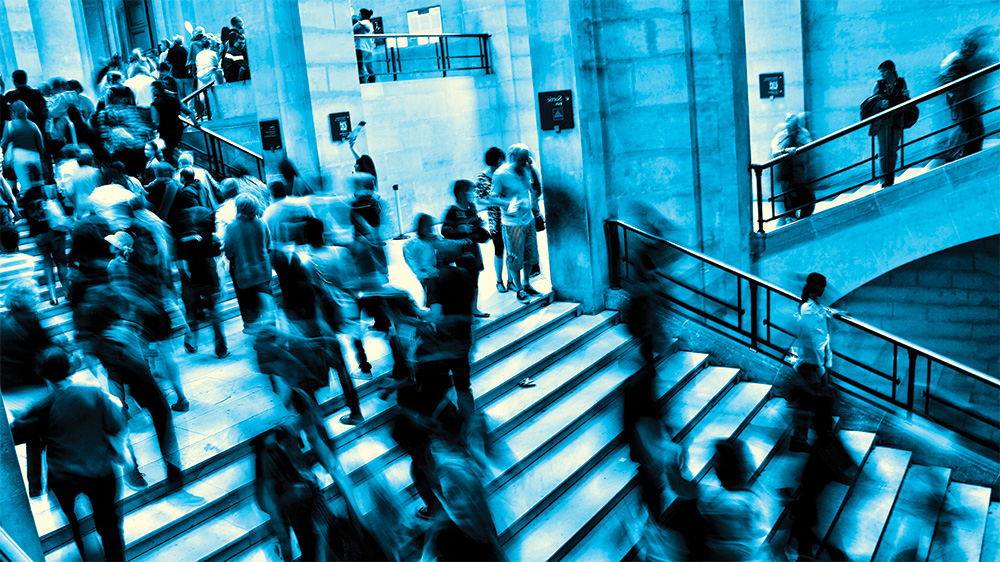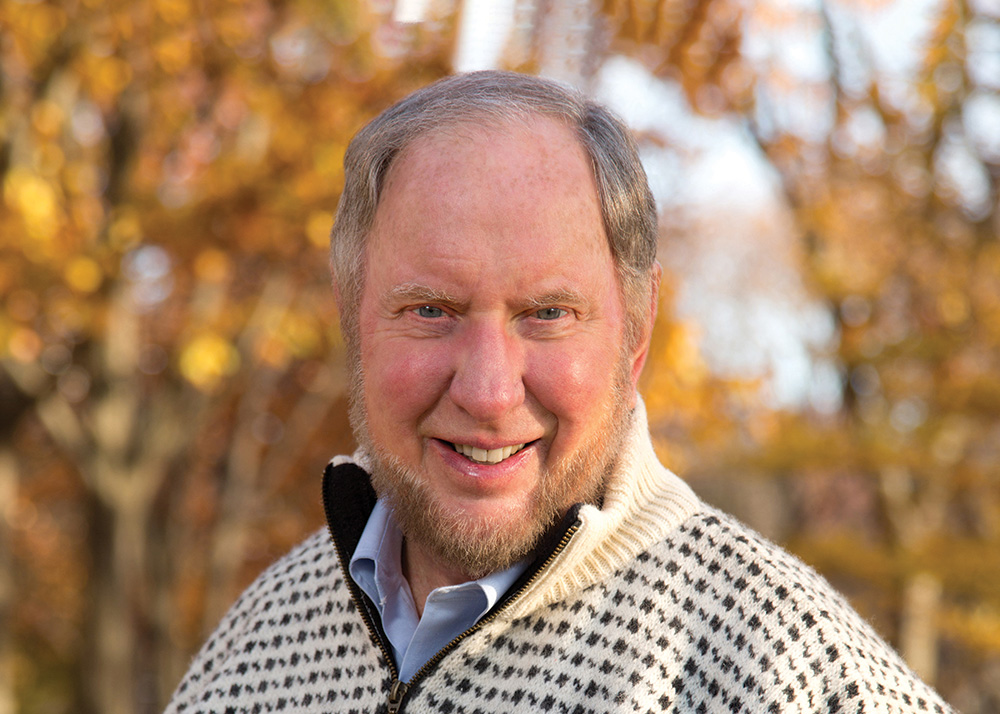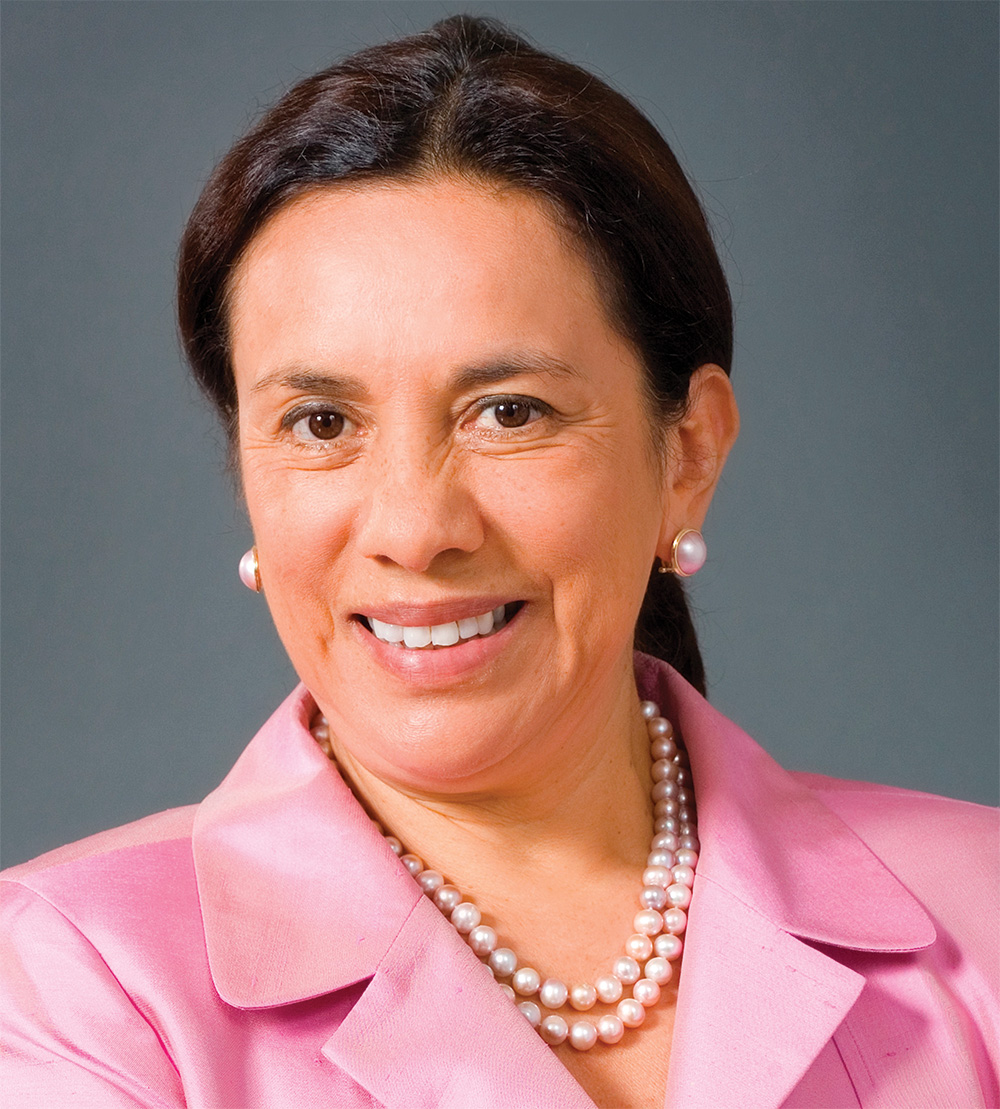2112th Stated Meeting | April 13, 2023 | In-Person Event at the American Academy of Arts and Sciences and Virtual Event
On April 13, 2023, the Academy presented its Talcott Parsons Prize for distinguished and original contributions to the social sciences to Robert D. Putnam. First awarded in 1974, the Talcott Parsons Prize was established to honor the noted sociologist and former president of the Academy. Previous recipients of the prize include William David Labov (linguistics), Joan Wallach Scott (history), Daniel Kahneman (psychology), and William Julius Wilson (sociology).
The program included the presentation of the prize by Chair of the Board Nancy C. Andrews and Academy President David W. Oxtoby, followed by a conversation between Antonia Hernández and Robert D. Putnam on civic connection and its implications for American democracy today. An abridged and edited version of the remarks follows.
David W. Oxtoby
David W. Oxtoby is President of the American Academy of Arts and Sciences. He was elected to the Academy in 2012.
Good evening and welcome to our program honoring Robert D. Putnam with the Talcott Parsons Prize for distinguished and original contributions to the social sciences. We are excited to be joined by so many, both here in Cambridge and in our virtual audience.
I would like to begin by acknowledging that this evening’s celebration is taking place on the traditional and ancestral land of the Massachusett, the original inhabitants of what is now known as Boston and Cambridge. We pay respect to the people of the Massachusett Tribe, past and present, and honor the land itself, which remains sacred to the Massachusett People.
It is my pleasure as president to call the 2112th Stated Meeting of the American Academy of Arts and Sciences to order. Tonight, we celebrate one of the most prolific and important social scientists of our time. Robert Putnam is the Peter and Isabel Malkin Professor of Public Policy at Harvard University. His research—especially on social capital and two-level game theory—has been very influential, and he is among the most cited social scientists of the last half century. Bob has been described as the “Poet Laureate of Civil Society,” and his insights into our fraying social fabric are indispensable as this country considers how to revive our American community.
Bob has been a member of the American Academy since 1980. His work on social capital, which has shaped our modern understanding of the American experiment and predicted so much of what we have seen in the last few years, began as a series of meetings here at the House of the Academy in the 1990s.
More recently, Bob’s research has been essential to informing the work of the Academy’s Commission on the Practice of Democratic Citizenship. The influence of his work is visible in the Commission’s final report, Our Common Purpose: Reinventing American Democracy for the 21st Century. The report references Bob both explicitly—in the section on expanding our civic bridging capacity—and implicitly—in its overarching belief that the reinvention of our democracy relies on creating a resilient and healthy culture of connection and association.
Later this evening, Antonia Hernández, a member of that Commission, will join Bob in conversation about his career and the future health of our civic culture. Antonia is President and CEO of the California Community Foundation and a prominent advocate for social justice. She also serves as a member of the Academy’s Trust and as a member of our Committee on Anti-Racism. She was elected to the Academy in 2016. Antonia recently announced her retirement from the California Community Foundation after nearly two decades of leadership. We congratulate her on this milestone and are so grateful she could join us this evening.
I want to thank our prize committee, led by Pauline Yu, president emerita of the American Council of Learned Societies, for their careful work and their inspired selection. The Talcott Parsons Prize is one of eleven Academy prizes, and it is named in honor of the prominent sociologist and former president of the Academy. The prize was most recently awarded in 2019 to William Labov for his work in linguistics.
Bob, we are proud to be honoring you this evening, and thrilled to welcome your friends, colleagues, and family—both here and online. I want to personally congratulate you and thank you for all of your work in service to new knowledge.
And now it is my pleasure to invite Executive Vice President and Chief Scientific Officer of Boston Children’s Hospital and Chair of the Academy’s Board of Directors Nancy Andrews to join me in formally conferring the award. As many of you know, Nancy is completing her term as Board Chair at the end of June. We have been so fortunate to have her steady leadership since 2017.
Nancy C. Andrews
Nancy C. Andrews, Chair of the Academy’s Board of Directors, is Executive Vice President and Chief Scientific Officer of Boston Children’s Hospital. She was elected to the Academy in 2007.
It is my pleasure to read the prize citation.
For his extraordinary, original, and sustained contributions to the advancement of the social sciences, the American Academy confers the Talcott Parsons Prize on Robert D. Putnam.
Your research and studies have been both groundbreaking and transformative. Over the course of your distinguished career, you have contributed significantly to the fields of political science, sociology, and public policy, with a particular focus on the study of civic engagement and its impact on democratic participation. This work includes a major project at the Academy during the 1990s on the importance of civic engagement to issues of democratization and economic development in the United States and in developing countries.
You have inspired a generation of scholars to explore the causes and consequences of declining social capital. More specifically, your seminal work, Bowling Alone: The Collapse and Revival of American Community, has had a profound impact on the way that scholars and policy-makers understand the importance of social capital in promoting democracy.
In recognition of your extraordinary contributions to the social sciences, you are widely celebrated as one of the most important political scientists of our time. Your work has been recognized with numerous awards, including the Johan Skytte Prize in Political Science, the James Madison Award from the American Political Science Association, and the National Humanities Medal.
Beyond your academic contributions, you have been a tireless advocate for civic participation, working closely with community organizations and policy-makers to develop actionable ideas for civic renewal.
Renowned political scientist, influential scholar, and beloved mentor, through both thought and action you have counseled and inspired us to appreciate the value of social connections and engagement in promoting a healthy and vibrant society. A true legacy.
Robert D. Putnam
Robert D. Putnam is the Peter and Isabel Malkin Professor of Public Policy at Harvard University. He was elected to the American Academy in 1980.
Thank you very much for this honor. My remarks embody three kinds of thanks. The first is thanks to the Academy, of course, and to its prize committee for this remarkable award. And it is especially significant because of the role the Academy played in the initial stages of my work on the idea for which I am being honored.
I returned from Europe in the mid-1990s after a quarter century of studying in Italy, where I had stumbled upon the idea of social capital. The Academy seemed at that time to be the perfect place for me to explore this idea from multiple perspectives. So, about every two months for a year and a half I convened a remarkably diverse group from across the social sciences, including both advocates and critics of the concept of social capital itself. We did not seek, nor did we achieve consensus, but I came away convinced that this idea was worthy of more study. And I remain convinced of that three decades later. So, my thanks to the Academy for initially hosting our group and then three decades later for recognizing my work on social capital.
Second, I want to thank Antonia Hernández for leading tonight’s conversation about my work. Antonia’s distinguished credentials include membership in this Academy, but what may be even more relevant though less well-known is my long collaboration with Antonia and the California Community Foundation. Twenty-five years ago, when we were developing these ideas, I was seeking to transgress the sharp line between theory and practice that bedevils so much of our intellectual lives. I began a collaboration that continues to this day with community foundations across the country, including the California Community Foundation, to measure social capital in places like Los Angeles, Philadelphia, San Francisco, and Duluth, among other areas.
In 2000, these community foundations and I conducted a large survey on social capital along various dimensions, with roughly one hundred thousand subjects. It is called the Social Capital Community Benchmark Survey. Working with Antonia and her colleagues and with other community foundations, we tried to enhance, in practicable and actionable terms, the best forms of social capital in each community. These communities are not identical, of course, and social capital is not just one thing. The community foundations were our collaborators.
Over the last quarter century, more than half of my time has been devoted to this activity. I have spoken with thousands of civic leaders and citizens across America, from Portland, Maine, to Portland, Oregon, to San Diego, Duluth, and Baton Rouge. I am proud of this effort, and I want to thank Antonia for representing that part of my work.
Finally, I want to say thanks to my many friends and family members who have contributed so essentially to my scholarly work, some of whom are here today. As the Beatles sang in 1968, just as I was beginning my professional life, I have gotten by “with a little help from my friends.” My first mentor was Bob Dahl, who was the first political scientist to receive the Academy’s Talcott Parsons Prize. Above all, I want to thank my lifetime partner in all things, Rosemary Putnam. On January 20, 1961 as twenty-year-olds we traveled to John F. Kennedy’s inauguration, where in a life-changing moment we heard Kennedy admonish us to ask what we could do for our country. She has accompanied and supported me in every step of my more than six-decade journey since that day.
Discussion
ANTONIA HERNÁNDEZ: Bob, it is a pleasure to see you again.
ROBERT D. PUTNAM: Thank you.
HERNÁNDEZ: To prepare for our conversation this evening, I reread many of your books. Frankly I was a little depressed after I finished reading Bowling Alone. Then I read Our Kids, about what is happening to our children and to our society, and it was a rather gloomy story. In your new book, Upswing, no matter how bad the statistical evidence is, you find something positive to say. Given all the challenges in our society today, you see a reason to be optimistic about our democracy. Please share with us a little bit about where that optimism comes from.
PUTNAM: There is a certain irony that has not escaped me since my work was inspired by Kennedy’s appeal. Back then, America was more collaborative politically. We were connected with one another. But since then, and this is consistent with the pessimism that you described, we have become more polarized, more individualistic, and less focused on what we have in common.
Jonathan Sacks, who died in 2020, was the Chief Rabbi of England from 1991 to 2013. A brilliant moral philosopher, he made a distinction between optimism and hope. He said that optimism is a passive virtue. It is a descriptive term, in which you have separated yourself from the world. Hope, he said, is an active virtue. Hope says, “I can see how things could be better and I want to make them better.” I am hopeful, if not optimistic.
HERNÁNDEZ: During the COVID-19 pandemic, we have seen the benefits of technology, but we also know that there is a downside to technology. You touch upon this in your latest book. Could you talk a little bit about how technology is changing our society for the better and for the worse?
PUTNAM: Social scientists have known for a while that Facebook is not the equivalent of bowling leagues. Even great video connections, like Zoom, are not the same thing as face-to-face connections.
For many of us, our network connections are simultaneously internet-based and face-to-face. Almost everybody that you talk to online you also know in person. So, our networks are a kind of alloy.
How can we combine the advantages of the internet with the advantages of face-to-face communication? A former student of mine sought to create one such alloy. He figured out how to use the internet to make it easier to connect with your actual physical neighbors. He found a way to use the advantages of the internet to build real face-to-face connections.
HERNÁNDEZ: In your book Upswing, you highlight the importance of human interaction and balancing our sense of individualism with care for the community. You also say that we are going to reinvigorate our democracy from the ground up. French aristocrat Alexis de Tocqueville, who studied American life in the 1830s, said that being engaged in your community, in your school, in local activities, is what makes a community vibrant. Do you think we are going in that direction?
PUTNAM: Tocqueville was struck by how Americans cooperated with each other to solve problems. He said if you want to solve a problem in France, you look to the State. If you want to solve a public problem in England, you look to the king or to the aristocracy. If you want to solve a problem in America, you look to other people because everyone pitches in together. Americans form groups.
Tocqueville was a leading advocate of communitarianism, but he was also in favor of individualism or “self-interest rightly understood,” meaning you should follow your own self-interest, but also think about the larger picture. Let me offer a contemporary example of that. You may not want to wear a mask, but it is in your interest in the long run to wear one because it protects everybody, including you.
In our book The Upswing, Shaylyn Romney Garrett and I reported a striking parallel between the plight of America today—political polarization, economic inequality, social isolation, self-centeredness—and the plight of America 125 years ago at the end of the Gilded Age. We also found that during the Progressive Era, around 1900 and 1910, America emerged from those dark times and began an upswing toward political comity, economic equality, social connectedness, and altruism that would last for the first two-thirds of the twentieth century.
So were there any insights that reformers today could learn from that earlier upswing? We discovered many such lessons, but the two most important were these: First, that the leaders of the Progressive Movement were mostly young folks in their twenties. Older people then (and now) could recognize the problems, but they were not best equipped to imagine new proposals for the future. And second, the most important leading indicator of change—the one thing that if you could fix it everything else would follow—was not economics, but morality. It took a moral renewal, a sense that we have obligations to other people and can’t just focus on our self-interest.
Greta Thunberg is an archetype of what we need right now, because she is young and because she frames the issue of global warming in moral terms. The fact that she has a large audience gives me hope.
HERNÁNDEZ: Thank you. We have some time for a question from our audience.
Audience member: Town meetings began here in Massachusetts as a formal and social way of getting together to make decisions. How is this concept of small government by people reflected in your work?
PUTNAM: The reforms of the Progressive Era were bottom up, not top down. It was local government that first had the ideas, which then trickled up. Let me give an example. The public high school—four years of free public education for every child in town—was first invented in America in 1910. It was not invented in Boston or in Washington. Rather it was invented in tiny towns in flyover country, in Iowa, Kansas, and Nebraska. The rich folks in town, who sent their children to private schools, had to agree that the kids on the other side of town were also their kids and needed their support. That’s the first thing.
Second, giving a high school education to everybody in town was the source of most of the economic growth in the United States for much of the twentieth century. This example shows why you need to begin at the local level.
HERNÁNDEZ: Thank you. We have come to the end of our program. Thank you, Bob, for our wonderful conversation this evening.
PUTNAM: Thank you.
ANDREWS: Let me offer my thanks to Bob and Antonia for a very enlightening conversation and for reminding us of the opportunities that we all have—to think about this country, to engage civically, to strengthen America, and to ask the young people to take us to a new place.
Congratulations Bob on receiving the Talcott Parsons Prize. This concludes the 2112th Stated Meeting of the American Academy of Arts and Sciences.
© 2023 by Robert D. Putnam and Antonia Hernández, respectively


